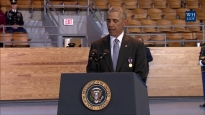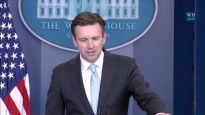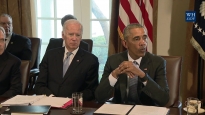Press Briefing on NATO Defense Capabilities
May 20, 2012 | 22:28 | Public Domain
U.S. Ambassador to NATO Ivo Daalder and Deputy National Security Advisor Ben Rhodes brief the press after the first NATO session at the Chicago summit, a North Atlantic Council focusing on NATO defense capabilities.
Press Briefing by U.S. Ambassador to NATO Ivo Daalder and Deputy National Security Advisor Ben Rhodes
Press Filing Center
McCormick Place
Chicago, Illinois
5:50 P.M. CDT
MR. RHODES: Hey, everybody. Thanks for sticking around. So what we’re going to do now is read out the first NATO session, which was a North Atlantic Council that focus on NATO defense capabilities. We have with us Ambassador Ivo Daalder, the U.S. Ambassador to NATO, and the man who sang “Take Me Out to the Ballgame” at Wrigley Field last night. (Laughter.)
The President will have the ISAF session on Afghanistan in the morning, and then he will have the session with NATO partners in the -- falling then in afternoon, and then he'll hold the press conference. So we'll keep you updated on those developments tomorrow. But we'll turn it over to Ivo to do the defense capabilities pieces.
AMBASSADOR DAALDER: Thanks, Ben. And thanks, all, for staying up and out here. There's another ballgame that you missed, but I was in the NAC; I couldn’t sing.
Anyway, 18 months ago we had our last summit at NATO at Lisbon in which we agreed to set the stage to revitalize the Alliance, ready for the 21st century. We would try to ensure, to figure out how NATO could be ready, fit for purpose, for the threats that we face today and tomorrow. And we decided there that we would deploy and develop a NAC territorial missile defense system, that we would pursue a set of critical capabilities to make the Alliance ready to meet the challenges of today and tomorrow, and to do an overall review of our deterrence and defense posture.
At Chicago, we are delivering on the promises that we had in Lisbon. The leaders today, in the first formal NAC session, took stock of where we stand, and they made a number of fundamental decisions to make sure that NATO will have the right capabilities. NATO will develop what we call a NATO Forces 2020 concept -- a concept whereby NATO, in 2020, eight years from now, will have and continue to have the capabilities necessary to address the threats that we -- and the challenges that we face.
We also adopted a Deterrence and Defense Posture Review that showed what the appropriate mix of conventional nuclear and missile defense forces should be in order to advance our deterrence and defense capabilities. And we agreed that NATO should be prepared to considered reciprocal reductions in non-strategic nuclear forces deployed in Europe.
Among the critical capabilities that we focused on today in the session and that was decided, was the decision regarding missile defense. The leaders, at the end of the session, declared that they would agree to have an interim NATO ballistic missile defense capability. What does that mean? It means that NATO will now have an operationally meaningful ballistic missile defense mission. It will be limited in the initial phase, but it will expand over time. It will, as of today, provide real protection for parts of NATO Europe against ballistic missile attack.
We agreed to a set of command and control procedures for ballistic missile defense. We designated the Supreme Allied Commander of Europe, Admiral Jim Stavridis, as the commander for the ballistic defense mission. We have tested and validated the command and control capability by all 28 allies. We have agreements with four countries -- Spain, Turkey, Romania, Poland -- to host U.S. missile defense assets. Allies themselves have committed to invest over $1 billion in command and control and communications infrastructure needed to support the NATO ballistic missile defense system. And the President has directed the transfer of the operational control of the radar in Turkey to NATO.
U.S. missile defense ships are already in the Mediterranean and they are able to operate under NATO command -- under NATO operational control when necessary in a crisis.
As I said, this is the beginning of the deployment of ballistic missile defenses. The initial operating -- operational capability should be achieved by 2015; and by 2018, we will have a fully operational capability for NATO ballistic missile defense. This decision, which we had agreed would need to be taken in Lisbon, now means that NATO has, for the first time, a theatre -- a territorial missile defense capability.
There were other critical capability decisions that we made. Just a few minutes ago, NATO signed a contract to acquire the Alliance Ground Surveillance system. These are five Global Hawk drones that provide the kind of surveillance capability that we saw in the Libya operation was so vital to the effective operation of our military. Then, we relied on the United States to provide it; in the future, NATO will have the capacity to deploy these drones.
We also agreed to extend the Baltic air policing mission. The President noted the importance of having allies providing aircraft to police the Baltic states so that the Balts can invest their resources in other -- into other operations, including their very important commitment to Afghanistan.
And we supported the Smart Defense Initiative by the Secretary General, where, in a time of austerity, we are promoting more specialization and more multilateral cooperation in order to make sure that the European defense euro or krone, or, indeed, the U.S. dollar goes further than it would if we were spending it by ourselves.
Finally, as part of the Deterrence and Defense Posture Review, as I said, we looked at our nuclear posture, as well as our conventional and our missile defense posture. With regard to the nuclear posture, we reaffirmed, as we did in Lisbon, that NATO will remain a nuclear alliance for as long as nuclear weapons exist, and as long as we have nuclear weapons that those weapons will be safe, secure and effective.
But we also affirmed that NATO will look at ways to reduce
-- further reduce its reliance on nuclear weapons. And we recognized the value of national negative security assurances -- assurances that the United States and other nuclear powers have made that we will not threaten -- use or threaten to use nuclear weapons against other state -- non-nuclear weapon states who are in full compliance with their NPT, nuclear non-proliferation obligations. And we agreed that we would pursue further reductions on a reciprocal basis of nuclear weapons in Europe.
So those were the major decisions that leaders reached today. As I said, they were the implementation of the kinds of vision that we had laid out in Lisbon 18 months ago. In that sense, we promised in Lisbon; and in Chicago, we were able to deliver. And with that, I'm happy to take some questions.
Q I wonder if you could tell us what the discussion about Syria consisted of, and whether there was any indication that Turkey, as it has said publicly recently, would discuss implementation or application of Article IV or indeed Article V?
AMBASSADOR DAALDER: There was no discussion in the session today about Syria. And there was -- Turkey raised issues on -- related to capabilities, did not raise the issue of Syria or Article IV or Article V.
Q Can you talk about why there was virtually no talk formally within the Alliance about Syria? The Secretary General said that NATO has absolutely no intention of taking any action inside Syria. And I'm wondering -- many on the Hill, some of your predecessors have said that’s a really bad signal to send to President Bashar al Assad given the fact that you have recognized that the Annan plan isn't working, and he feels that he can completely continue with impunity because there's absolutely no credible threat of military action.
AMBASSADOR DAALDER: As I said, the issue didn’t come up. There are, at present, no planning going on that’s related to a NATO role in Syria. The situation in Syria is, indeed, a negative one. We are continuing to find ways to pressure -- put pressure on the regime, to abide by the Annan plan, to implement it. We will continue to find different ways of pressure. And at the moment, that does not include a active discussion on NATO issues.
Q But do you think it's a wise idea to publicly say that you have absolutely no intention of doing anything like that?
MR. RHODES: Look, let me say a couple things on this. First of all, as it relates to NATO planning, a NATO ally has to come forward and request that type of planning. So that’s a circumstance that hasn't taken place. We'd obviously take any requests of that nature seriously if it were to be made. So that’s something that we'll be monitoring going forward.
I think with respect to Syria, I'd say a number of things. First of all, we have, within the framework of the Annan plan, an international community that’s working to stop the violence within Syria, but also, at the G8, we made a point of elevating the need for a political transition to get underway within Syria, because it's our belief that you're not simply going to stop the violence within Syria by putting monitors into the country -- as important as that is -- to bring the violence down; that there needs to be a credible political transition process that gets underway.
And so the G8 focused on this as a major topic of discussion. It was one of the principal topics at the leaders dinner, and the decision was taken out of there to elevate the focus on a political transition.
Separate and apart from the Annan plan, we've been working through the "Friends of Syria" process so that the United States, together with like-minded countries, can apply pressure on the Syrian regime, precisely because we are so concerned about the situation there.
And what we've done together with our European allies, our Arab partners -- and, of course, within that context Turkey plays an important role as well -- is provide assistance to the Syrian opposition. That includes political and diplomatic support. The U.S. has also taken the step of providing non-lethal assistance, such as communications equipment, medical equipment, humanitarian assistance as well as, again, helping them determine a road map for an inclusive future within Syria. And we've also coordinated sanctions. And I think when you look at the pressure that has had the most effect on the Assad regime to date, it's the fact that they are seeing a significant drop in their revenues and their ability, ultimately, to sustain themselves because of the coordinate sanctions that we've done through the "Friends of Syria" grouping.
We've also decided, however, that a military intervention of the nature that we did in Libya would further militarize the situation in ways that wouldn’t necessarily protect civilian life; that unlike Libya, you don’t have pockets of the country that can be protected by civilian protection zones, you've got security forces intermingled with the population; and that introduction of greater military intervention from outside or arms to groups within Syria could further militarize the conflict in a counterproductive way.
So our focus right now is working on the tracks that we have. Let's send a clear message that there needs to be an end to the violence. Let's get monitors in the country to support that initiative. Let's begin a political transition, and within that context, let's also provide support to the Syrian opposition and let's continue to put pressure on the Assad regime, including through a very robust and coordinated set of sanctions.
Q Two weeks ago, in front of the council on foreign relations, you said you were convinced that French troops would be still in Afghanistan in the end of 2014. I would like to know if you are disappointed, and if you feel the specifics the French have been given -- the assurance that's been given to you --
AMBASSADOR DAALDER: I think what I said is that troops, French troops, would still be in Afghanistan in 2014. And indeed, President Hollande has announced that he will fulfill his campaign pledge of withdrawing combat troops, but there will remain a presence within the NATO-led mission of ISAF through the end of that mission, which is the end of 2014. And in that regard, I think France has fulfilled -- has continued to remain committed to the decision we laid out in Lisbon, which was “in together, out together.”
The way in which countries contribute to the mission will evolve, ours will evolves, ever country’s will evolve. And France will, in the future, focus more on training than it has in the past, and that is perfectly appropriate because we are increasingly shifting responsibility to the Afghan national security forces for the security of the country.
Q -- with the United States troops after 2014?
AMBASSADOR DAALDER: That’s a question you will have to ask the French President.
MR. RHODES: And just to add to that, the NATO-ISAF combat mission is obviously concluding at the end of 2014. I think individual nations are going to make -- just as NATO will -- individual nations are going to make their own decisions about what their partnership is going to be with Afghanistan after 2014.
France does have a strategic partnership agreement with the Afghans so we fully expect that France will continue to be a supporter of Afghanistan, of its government, into the future. And as Ivo said, and as we addressed before, I think we’re understanding of the fact that different nations make different decisions about their national actions.
We do believe that France can continue to be a credible partner and an important part of the ISAF mission in ways such as training, advising, instructing after their combat -- particularly combat role is concluded.
Q Are we going to see any steps towards NATO expansion at this summit, and if so, what will they be?
AMBASSADOR DAALDER: We will address the issue of the aspirant countries, countries who aspire to be part of NATO, both in our communiqué and, importantly, we will have a meeting tomorrow with those four countries: Bosnia, Macedonia, Montenegro and Georgia. And we will have a discussion at foreign minister level about their aspirations, about how they are making progress towards membership.
An actual invitation to membership will not issued at this summit -- this was never going to be an enlargement summit -- but we are fully supportive of the efforts of countries who want to become members of NATO, as we are supportive of countries to have a partnership with NATO when they don’t want to necessarily join NATO.
And those are the kinds of issues we will address both in our partnership meetings tomorrow with our ISAF partners, but the -- a core partner meeting that the President will be present with all the other leaders of 13 countries who are making significant political and military and other contributions to Alliance operations and what the Alliance does.
And, as I said, we will have a meeting with four countries that have demonstrated and said that they would like to join the Alliance and see how far they have gone on that path. And we will continue to engage with them on an individual basis because it is not a group of countries that will become members of NATO; it is individual countries who will be invited if and when they have made the necessary progress for such an invitation to be extended.
Q When you say fully supportive, do you mean that the administration supports them becoming members, or supports them in a more abstract sense -- to apply, to ask for --
AMBASSADOR DAALDER: We believe that the Euro-Atlantic integration of the Western Balkans, of other parts of Europe is important and that the prospect of membership by NATO -- for NATO, by these countries is one of the things that entices them to make the necessary political and economic reforms, and military reforms, to contribute to security in the North Atlantic region.
MR. RHODES: Anything else? We’ll take one more in the back.
Q The interim capability had been talked about for many months before the summit. How specifically does this play into the talks coming up --
AMBASSADOR DAALDER: The decision that was made here is to enable NATO to have the command and control of national assets that individual countries can contribute. So the United States would contribute its radar, and in the times of need, would contribute the Aegis-capable ships.
And in that sense, the actual capability has existed since the end of 2011, as far as the United States is concerned. Now that capability will be made -- it is possible to make that capability available to NATO. That is the fundamental change, and in that sense it has -- that’s the only thing that we have done. We have moved from a U.S. capability that is extent and will continue to exist, to one that is now -- can be made available to NATO and operate under NATO rules of engagement, NATO agreements on how the command-and-control system is supposed to operate, and formally, under the operational control of a NATO commander as opposed to a U.S. commander.
MR. RHODES: I'd just say one other thing on that. With respect to Iran, when we took office we took a hard look at our missile defense planning and we redesigned a missile defense system that we felt was focused on a careful threat assessment.
And it was our assessment that the greatest ballistic missile defense -- or ballistic missile threat to the Alliance and to the United States and our interests was from Iran, for instance. And so we have designed a system that will be focused on threats emanating from that part of the region and particularly from Iran. And that is a system that, of course, is going to continue to come online.
And the other thing I’d say about this is there’s a lot of talk about missile defense in the United States; there has been for many years. I think what we’ve demonstrated in this administration is not just talk on missile defense but action. We see now the deployment of a missile defense system that is transitioning now to the defense of NATO, that ultimately will provide for the defense of Europe and the United States. We have concrete commitments and plans to move forward with the deployment of this system, with four countries already stepping forward to play their part in hosting part of the architecture.
So I think that today reaffirms, I think, the very strong record that we’ve built on missile defense. And even as we continue to have our differences with the Russians that we would like to work through, I think we’re demonstrating that we’re moving forward with our plans. And we’ll continue to talk to the Russians, of course, as we do. But today is another milestone in demonstrating that we’re serious about the threat from ballistic missiles. We assess that that threat comes in part from Iran, and that the Alliance as a whole is going to have this capability, and it’s going to grow stronger over time.
Q Follow on that -- and forgive me if you went over some of this -- how far across Europe does the interim capability mean the shield extends? And how is that different from IOC in a couple of years? Where there will be more of Europe covered?
AMBASSADOR DAALDER: Right now, it is a part of southern Europe that will be able to be covered. After -- we right now have only ship deployed that is possibly dedicated to NATO. We have the radar in southeast -- in Turkey.
As over time, as more ships come online -- and by 2014 we should have about four ships into the Mediterranean -- that footprint for the defense will extend to larger and larger parts.
IOC relates to the command-and-control capability of the NATO system. By 2015, we have said we will deploy land-based Aegis SM-3 interceptors in Romania in 2018; by 2018 in Poland. As you deploy more capability, interceptor capability and more ships with radars, the ability to protect more and more of Europe will increase with the threat moving from short- to medium-range missiles today to intermediate-range ballistic missiles, and in phase four of our system to intercontinental ballistic missiles by 2020.
Q So can you say which countries are protected now in southern Europe?
AMBASSADOR DAALDER: Now, that’s an operational kind of decision that because it’s an operational decision we won’t go into. Our ability to protect different countries, because it is a mobile system, exists. And we have looked at the rules of engagement and a defense design for a wide variety of places that could be protected by the fact that the ship can be moved.
MR. RHODES: All right, thanks, everybody. We will see you all tomorrow, and, again, kick off in the morning with the ISAF session. Thanks.
END
6:12 P.M. CDT
|
January 6, 2017
|
January 6, 2017
|
January 5, 2017
|
January 5, 2017
|
|
January 4, 2017
|
January 4, 2017
|
January 4, 2017
|
January 4, 2017
|
- &lsaquo previous
- 1
- 2
- 3
- 4
- 5
- 6
- 7
- 8
- 9
- …
- next &rsaquo







